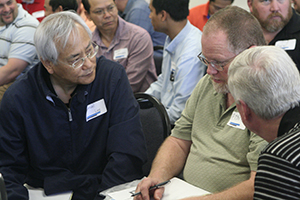Making disciples isn’t just the responsibility of pastors and church leaders. Every individual believer has a part to play in fulfilling the Great Commission of Jesus Christ.
“God is not going to ask our church to do something that He’s not asking us to do,” said Bruce Raley, director of church partnerships with LifeWay Christian Resources, to a recent gathering of church and lay leaders in High Point.
Raley was the keynote speaker for the Baptist State Convention of North Carolina’s “One Day” training event for church leaders and volunteers, held May 2 at Green Street Baptist Church. The event brought together more nearly 600 attendees representing 102 churches, who received equipping and training in all aspects of church ministry.
Attendees spent much of the day in various breakout sessions on an array of ministries, ranging from children’s to senior adult ministry and everything in between.
|
Bruce Raley |
Raley helped attendees see how every ministry of the local church should be aligned to make disciples. He also led sessions with pastors to help them create, cast and implement a vision for making disciples within their churches.
The mandate to make disciples is often viewed as a responsibility of pastors, Sunday school teachers or other leaders in the church, Raley said. But since the church is made up of people who are known as disciples, we are all called to make disciples. “Scripturally, it’s disciples making disciples,” Raley said. “We are to reproduce ourselves. Disciples reproduce disciples.”
Raley said discipleship is not about information or behavior modification. Instead, discipleship is about transformation, and that process happens best when we engage, share and invest our lives with others. “Discipleship takes place best in the context of relationships,” Raley said. He then identified four relational spheres or environments where discipleship takes place. Raley described those spheres as four concentric circles that flow out from one another.
The innermost circle where discipleship begins is the relationship that Raley described as “God and me.”
“Discipleship takes place when a child of God is in the Word of God with God on a daily basis,” Raley said. He also cited several long-range studies that indicated that the No. 1 indicator of a person’s spiritual growth is whether or not they spend time reading and studying the Bible on a daily basis. “If we don’t help people read the Word, know the Word and listen to the Word of God, all the rest of these environments are going to be very difficult to penetrate,” Raley said.
|
BSC photo by Chad Austin Pastors discuss some points made by Bruce Raley, director of church partnerships with LifeWay Christian Resources, during One Day training May 2 in High Point. |
The next sphere of discipleship is in the area Raley calls “my family and me.” This involves accepting the biblical instruction to be a disciple-maker in the home as described in Deuteronomy 6.
Raley added that family discipleship doesn’t end when one’s children are grown. He described how he continues to disciple his adult children even though they live in different parts of the country.
Each week, Raley writes a handwritten letter to his son and daughter, which includes biblical truths that God has taught him. Additionally, Raley and his son are reading a book together and discussing it during weekly phone conversations.
“We need to help our families know how to disciple one another,” Raley said.
The third environment is what Raley calls “other Christians and me.” Raley said this sphere is where most of the emphasis on discipleship has taken place. We must be careful, however, not to neglect other areas, Raley said.
“The Bible clearly teaches that we are to be in community with one another,” Raley said. “We are to do life together, and this is an integral part of discipleship, but it’s not the only part.”
Raley said the final sphere is with the “lost and me,” adding that the multiplying aspect of disciple-making involves helping others come to faith, grow in their faith and reproduce that faith in others.
“I do not believe that we are true disciple of Christ unless we are investing our lives in people who are without Christ,” Raley said. “When we are at work, in our neighborhoods or in our schools, we should be looking for opportunities to invest our lives in people who are without Christ.”
Raley compared these four spheres of discipleship to the ripples that form when a pebble is tossed into a pond. The illustration underscored why the discipleship process must begin at the inner sphere of spending time alone with God each day. “The ripples go all the way across the pond,” Raley said. “But the outer ripples don’t occur unless those inner ripples do first.”


